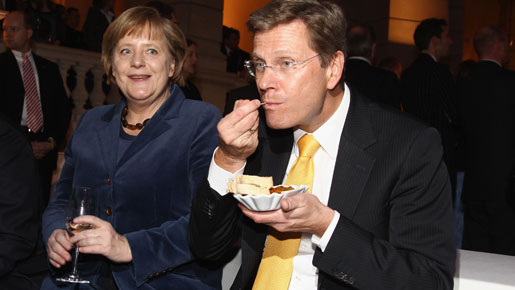

Receiving 397 of the 611 valid parliamentary votes, Merkel’s CDU-CSU coalition was sworn in in 2005. Yet, ‘Eine Schwalbe macht noch keinen Sommer,’ as they say in Germany, translating quite literally to ‘one swallow doesn’t make summer’; in the context of Angela Merkel’s coming to political fruition, public perception has endowed appearance with more weight than ever. An almost unprecedented use of demagogy following her election has been seen, realigning (or rather re-weighting) the focus to further celebrate Merkel’s election as a win over expectation.
This damaging rhetoric was employed by Social Democrat parliamentary leader Peter Struck, who in 2005 projected the opinion that “any woman who can fight her way to the chancellorship of the (Christian Democratic) Union has certain strengths,” continuing that “she has the opportunity to become a good chancellor”.
Society’s tendency to define people and politics in terms of unrealistic dichotomies has inevitably led to Merkel’s defining features being portrayed as her status as a Protestant, childless, female divorcee from east Germany with a background in the sciences. It’s populism as a façade, in a phrase.
So what’s changed since 2005?
The European shift to the right (Sarkozy, Berlusconi, Tusk, Reinfeldt and many more), further strengthened by the European elections constitutes what some might describe as a new paradigm. This on-the-face-of-it shift has been explained through the population’s desire for a return to pragmatism; pragmatism’s means of conviction is namely itself, centred around the portrayal of a core rationality. The reality, however, is once again that of a façade.
In Stock’s authorised biography, the German Chancellor positively dissociates herself from ‘rank-and-file democracy’, rather focusing on the power of the state. On issues including everything from party organisations and church groups to nuclear power, Merkel’s idea of leadership is clear at least in the sense that she wishes the general population’s power to emanate from the point just before her party was voted in, and not thereafter.
But what are Merkel’s opinions?
Merkel’s CDU focuses on tax cuts, especially for the low paid, tempered by the coalition SDU component, who rather focus on child benefit and infrastructure spending. Recently, German lawmakers voted in favour of capping new borrowing by the federal government, banning deficits in the 16 states and thus approving the constitutional amendment to shrink budget deficits until after the recession.
There has been a glut of talk about civil unrest in Germany, what with the country’s GDP set to drop by some six percent, but does this herald legitimated fears of civilisation taking to the streets and calling for the heads of their leaders? Unlikely. Merkel is still riding the wave of the façade, unleashing market forces and intensifying the residue left by the Schröder government; redistribution in favour of the rich; more elitism; privatisation; less restriction on the working week, and yet further distance from the ‘rank-and-file’ system.
Goals as Chancellor
Merkel’s long-term goal of breaking the alliance with the Social Democrats is held back by Germany’s lack of consensus. The Chancellor must avoid criticism of running too quickly from that famed post-war ‘German miracle’, a capitalistic caring if you will.
However, in times of crisis, post-war Germany has resorted to stability and bureaucratic leadership. With her schooling under Kohl, Merkel is certainly of the sitting-out-a-problem mindset; where Brown and Obama have relied on charisma and an altogether more pro-active approach to re-garner public support, Kohl’s teachings have further entrenched the tendency to see politics in terms of mutually exclusive, dichotomous categorisations.
Merkel is far from a master of risk-taking, yet she recently made the decision to let Arcandor, owner of the Karstadt department store chain, go bust. Contrary to this calculated risk, Merkel led the government-orchestrated rescue of General Motors unit Opel in May. Analysts have described this lack of consistency as Merkel distancing herself from ideology and returning to the façade of pragmatism relied upon by the far-right. At one and the same time, Merkel has been quick to criticise the Bank of England’s quantitative easing programme at a conference in Berlin: “What other central banks have been doing must stop now. I am very sceptical about the extent of the Fed’s actions and the way the Bank of England has carved its own little line in Europe. Even the European Central Bank has somewhat bowed to international pressure with its purchase of covered bonds.” She continues, “We must return to independent and sensible monetary policies, otherwise we will be back to where we are now in ten years’ time.”
Was she required to say that? German consciousness is stamped with the Weimar Republic’s failed experiment, leading some critics to argue that she made such a statement in order to distance her government from such a move and once again, restore faith in the pragmatism so revered by the electorate.

